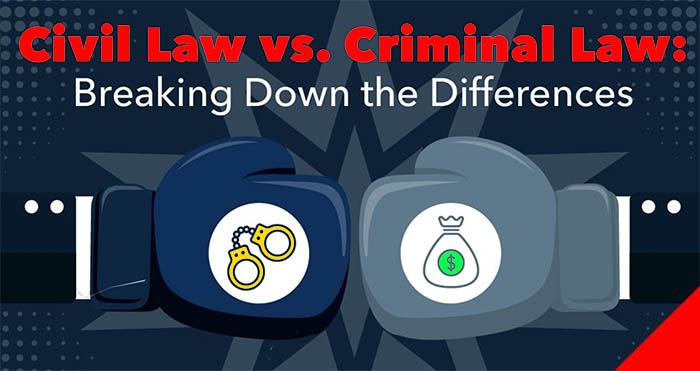
When you talk about law, there are two main types of law that may be referred to. These are civil and criminal law. Although it is important for people to know the difference between civil and criminal law, it is also important for them to have some knowledge on what the different laws entail.
Criminal Law
Criminal law defines an individual’s rights within society as well as what consequences can be incurred if they fail to abide by these legal rules enforced upon all of its members. Individuals are expected not incite harm or damage against others through physical action or inaction in order to keep the peace within society.
Failure to adhere to social norms leads one down a path which can result in criminal consequences. Crime is usually seen as something that causes damage to individuals or society at large, not including self-inflicted harm. Criminal law often creates rules which are enforced through the police and justice system to minimize crime.
Although criminal acts are not always easy to define, there are some common examples of crimes committed every day including vandalism, assault, theft of property, fraud and drug offenses. The costs associated with these crimes can be extremely high for all members of society.
If an individual commits a crime against another member of society they will most likely have to appear in court where their actions may result in imprisonment or other punishments depending on the severity of the offense committed against the victim. There are also infractions which do not require legal representation in court and the consequences can be much less serious.
Civil Law
Civil law is often considered to be the legal recourse taken by one individual or group against another. Visitors on holiday in Australia are likely to face civil rather than criminal offenses due to the country’s strict laws which are enforced by police officers throughout the country.
Examples of these types of legal actions include suing someone for breach of contract, claiming unpaid money from a loan agreement, filing divorce papers or even copyright infringement. Civil law does not usually result in imprisonment for those involved unlike crimes committed under criminal law.
One of the biggest differences between civil and criminal law is the fact that individuals are responsible for proving their case under civil law. It must be proven beyond reasonable doubt in order to get a conviction within criminal court. Civil court will require proof on the balance of probabilities, not beyond any reasonable doubt like criminal proceedings.
Criminal vs Civil Law
While both types of law have similarities and differences there are certain characteristics which define them as being different from each other. Criminal acts must involve some type of injury towards individuals or society while civil cases only require that one party has suffered some financial or emotional loss.
Criminal law is only concerned with punishing the perpetrator while civil cases brought forward may result in compensation for the plaintiff if they are successful in proving their case under civil proceedings.
Lastly, criminal cases will always be prosecuted by police officers to uphold society’s laws while many civil cases can be taken up by individuals who act on behalf of themselves or others who have chosen not to take legal action. The difference between criminal and civil law is an important factor in modern legal systems throughout the world.
You may be interested in: What to Do if Your Business is Facing a Civil Lawsuit

